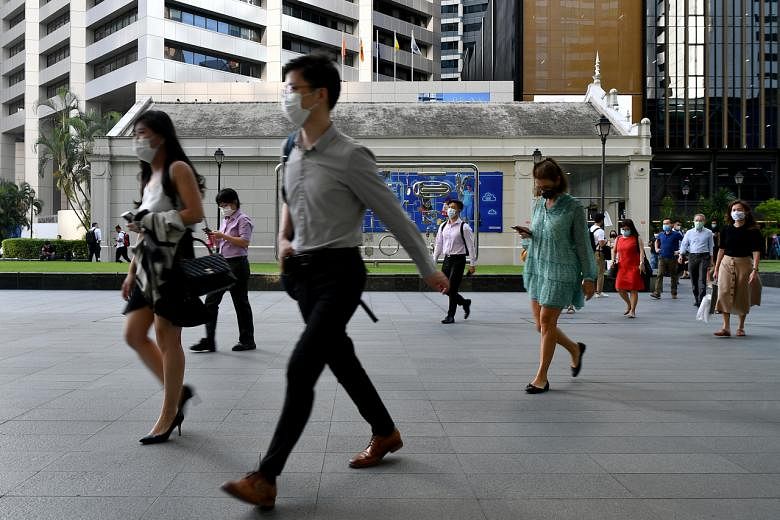SINGAPORE - Efforts are under way to recover the $370 million erroneously paid out in wage support grants last year, with some $250 million returned so far, said Minister for Trade and Industry Chan Chun Sing on Monday (May 10).
In a written reply to parliamentary questions on the issue, he also said the Government had secured a commitment from companies to return another $83 million.
Altogether, this comes up to 90 per cent of the total amount that was mistakenly paid out last year to some 5,400 companies as part of Jobs Support Scheme (JSS) to help tide them over the pandemic.
The Government is working to recover the remaining $37 million from the companies.
The same error, which came about after the duration used to determine the payouts was wrongly calculated, also resulted in an excess of $1.2 million being disbursed to 360 companies in foreign worker levy waivers and rebates.
The total number of companies affected by the error make up 4 per cent of all beneficiary firms.
Mr Gerald Giam (Aljunied GRC), Ms He Ting Ru (Sengkang GRC) and Non-Constituency MP Hazel Poa had asked how the mistake happened and how the money would be recovered.
Mr Chan said the Inland Revenue Authority of Singapore (Iras) will first offset the sum to be repaid against each company's future JSS payouts. Companies will be informed if there are still outstanding amounts they have to return after the final JSS payout.
He also said companies facing difficulties in repaying the excess they received will be allowed to do so through instalments. The mean amount paid in excess to the companies was $69,000, and the median amount was $3,300.
None of the companies that received the overpayments have been wound up to date, he added.
The JSS, introduced in February last year, provides subsidies for wage costs based on sectors. The mistake was first disclosed on April 8 by the ministries of Trade and Industry (MTI), Finance (MOF), and Manpower (MOM).
During the circuit breaker from April to June last year, all companies were entitled to the highest tier of JSS subsidies, with the payouts depending on how long they had to remain shut.
The mistake arose after the wrong dates were used to compute closures for companies in the construction, marine and process sectors. Instead of using the dates that companies had reopened to calculate the duration, the MTI used the dates they resumed particular projects, which were later than their reopening. This entitled them to a higher amount of JSS grants.
Subcontractors, clients and other project partners of these companies were also affected.
Mr Chan said: "As the processes for the resumption of business activities had to be implemented at short notice, MTI used existing systems and manual processes to grant approvals for businesses to reopen. Unfortunately, in so doing, mistakes were made with the reopening dates and concomitantly, the JSS payouts."
MTI, which was tasked with coordinating the shutdown and reopening of workplaces, received 1.8 million applications by companies wanting to resume business after the circuit breaker ended.
In other questions Ms Cheryl Chan (East Coast GRC) and Ms He asked what measures there were to ensure that government schemes, especially the Covid-19 schemes, are disbursed accurately.
To this, Deputy Prime Minister and Finance Minister Heng Swee Keat said: "For all government measures, including Covid-19 support measures, there is a series of checks to ensure that the grants are designed for and disbursed to the intended beneficiaries."
From the time schemes are designed to the time they are implemented and disbursed, clear guidelines and measures are put in place to ensure that grants are paid accurately and on time to the correct beneficiaries, he added.
The Auditor-General's Office also conducts regular audits on grant disbursements to ensure proper accounting and use of public funds, he said.
Giving more details on the error, DPM Heng said MTI had run sampling checks before passing data about the companies to the Central Provident Fund Board to compute payouts, but the checks did not pick up the error.
CPFB and Iras are the two agencies that implement the JSS.
It was Iras that detected the anomalies in end-November last year when performing independent audits and data analysis to compare the amount of JSS disbursed against past payout quantums.
This process had been put in place to flag anomalies for investigation and rectification, said DPM Heng.
After tracing the error to the reopening dates, MOM was alerted as the same time frame was used to compute waivers and rebates of the foreign worker levy.
Mr Heng said that since the incident, MTI has worked with MOF, MOM and Iras to carefully examine and rectify the processes and has put in additional checks and steps to make sure similar errors do not occur.
The compilation of reopening dates is also no longer done manually, and an external auditor has been engaged to thoroughly check and verify them, he added.
Noting that Singapore had to impose the circuit breaker quite suddenly to curb the spread of the coronavirus, Mr Heng said businesses faced tremendous pressure as a result, and the public officers involved in the JSS scheme had worked hard to disburse the grants quickly.
He added that the work to manage 1.8 million reopening applications had to be done manually, as an enterprise IT system could not be built up at such short notice.
"Unfortunately, mistakes were made in the process, resulting in the overpayments," he said.
"Nevertheless, our existing processes and checks enabled us to detect the lapse. Once detected, the agencies acted responsibly to put things right, and were upfront and transparent about what happened. We have learnt from this incident and will spare no effort to strengthen our processes, and to ensure that similar issues do not arise."












